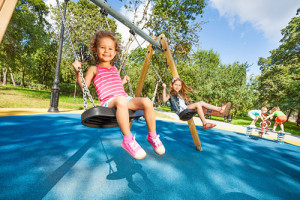Playground Politics
 You and your preschooler are enjoying a beautiful summer day at the park or the beach. She sees some friends from school and excitedly runs over to join them. As they play, you observe another child snatch a swing out of your daughter’s hands. Your child is told she can’t play with the group. Is this bullying?
You and your preschooler are enjoying a beautiful summer day at the park or the beach. She sees some friends from school and excitedly runs over to join them. As they play, you observe another child snatch a swing out of your daughter’s hands. Your child is told she can’t play with the group. Is this bullying?
A spate of recent articles tells us that bullying is happening at younger and younger ages. In fact, there’s even a new term for it: relational aggression. Social scientists define relational aggression as physical or psychological acts that are intentionally harmful, usually involving an imbalance of power. Two boys fighting over a swing who end up in a tug-of-war? That’s most likely healthy conflict that happens in parks and preschools everywhere. Young children are impulsive and active. Fights over playground equipment are typical behaviors, and kids learn how to problem solve, take turns and compromise through these types of everyday conflicts. When the intent is to exclude, humiliate or harm a child, it is defined as bullying.
Isn’t bullying an “older” kid problem? Not necessarily. Psychologists and researchers are noticing that children as young as age three can be involved in bullying behaviors. How can young children learn this kind of behavior? Experts believe a number of factors are responsible. Television programs are rich in rude behavior and disrespectful language. Making fun of others passes for entertainment in some shows. Another factor, experts say, is that young children often imitate behaviors they’ve observed. If children see parents, siblings or friends acting as bullies, they might try it out for themselves.
What can parents do to support and protect their kids? Observe your child when he plays at the park or beach. Find out what is happening – is the conflict simply two kids that want the same toy at the same time? Or is one child trying to exclude or harm another? Give your child some tools to use when told she can’t play. Using words to say, “I don’t like that” or “stop it” can sometimes be enough. Ignoring the bully can also be effective. Telling an adult should always be an option for young children.
What are some signs that your child might be the victim of bullying? Some children don’t want to go to school or activities that they’ve previously enjoyed. Other kids complain about stomach aches or headaches prior to school or a playdate that may be stressful. Some children become more withdrawn, or will verbalize that someone is bothering them.
Parents should also consider if their child’s behavior is bullying. Does your child have little empathy for other children’s feelings? Is she aggressive toward children and adults most of the time? Does he want to be in control all the time or feel that he’s always right? Remember, all young children demonstrate these traits given certain situations. If your son or daughter seems locked in to this kind of behavior and you feel it is a pattern, or if you’re getting feedback from teachers and other parents, it could be time to reach out to a professional. FSG offers Parent Consultations to help you evaluate behavior and address your concerns. For more information, contact kathy@familyserviceofglencoe.org.
